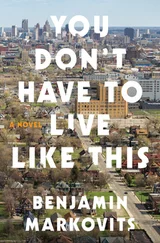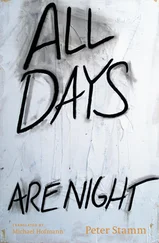“Tu es gentil ,” she said, and her eyes opened. “What’s that in German?”
“Friendly,” said Andreas, “kind, nice.”
“Nice,” repeated Delphine. She got up and went to the bathroom. She came back and got straight into her underwear.
They only just made it down to breakfast in time. Then they went back upstairs. Andreas read the newspaper, Delphine rummaged around in the bathroom, painted her toenails, and plucked her eyebrows. It was almost noon. Andreas opened the window and looked outside at the rain falling on the parking lot. The air had cooled down, and there was a smell of wet asphalt. Delphine came out of the bathroom, and leaned out of the window beside him.
“The forecast is poor,” he said. “It’s supposed to rain solidly for the next few days.”
“How much longer do you want to stay here?”
Andreas hesitated for a moment, then he said he felt good here, everything was familiar, the landscape, the climate, the names of the plants. Here, he said, he knew what was coming. Delphine countered that he had spent more of his adult life in Paris than in Switzerland.
“But this is where I grew up,” said Andreas. “I feel I never really arrived in Paris.”
He said his walk to school went around a large field. When the ground was frozen in winter, he would take a shortcut across the field. One time, it was the morning of Christmas Eve. It was still dark, and there was fog over the field.
“The teacher asked us to bring candles. In the middle of the field, I came to a stop. Over by the highway, the fog was dyed orange by the streetlights. I knelt down and pushed my candle into the earth and lit it. Don’t ask me why. I knelt down on the frozen ground, and watched it burn down. And then I went on to school.”
“Children are peculiar,” said Delphine. But she didn’t understand why he was telling her this. Andreas said he wasn’t going back to Paris.
“How do you mean?”
“I’ve given my notice.”
“Are you crazy?” Delphine looked at him in horror. “What’s gotten into you?”
Andreas didn’t reply. There was nothing he could have said. A truck drove up, and a man got out, and began to unload crates of bottles.
“What do you want to do here? Work as a German teacher?”
Andreas said he had enough money.
“Is it that woman?”
“I don’t think so,” said Andreas.
When he turned toward Delphine, he saw she was crying. He put his arm around her, and held her close. She broke away, and they stood silently side by side, watching the delivery man at work.
“If you need money for the train,” said Andreas.
Delphine looked at him, and shook her head.
They went to the station, and Delphine bought a ticket and reserved a berth. The train didn’t leave until ten, they had a lot of time. They drove up the hill to a restaurant with a view of the village, and down to the valley. From there you could see the river, and the wooded slopes and the mountains on the horizon. You could hear the traffic all the way from the highway. It had stopped raining, but the sky was still cloudy. Only in the west was there a little patch of brightness. The low sun made the clouds look darker.
It was cold out on the terrace, and the tables and chairs were wet with rain. Andreas and Delphine sat inside, at a table by a window. The place was almost empty. The landlady came. Andreas remembered her from before, she was only a few years older than him, and she had been a pretty girl then. Now she was a heavyset woman with a tired face. She seemed not to recognize him, and he didn’t say he was local.
Delphine had ordered a salad, but she hardly touched it, and pushed it away after a little while. Andreas wasn’t hungry either. He said it was a pity she was going already.
“What would have been the point of staying?” said Delphine, and she started crying again. The landlady came. She didn’t let on, only asked whether they were done, and if everything had been all right.
He just wasn’t cut out for steady relationships, said Andreas, after the landlady had gone.
“That’s not even the point,” said Delphine. “Do you think I want to marry you?”
“So what is the point, then?”
“I don’t know what to say to you,” said Delphine, half crying, half laughing. “If you don’t know that, then I can’t help you either.”
She could tell his mind was on this other women, she said. Andreas angrily shook his head.
“Nonsense,” he said. “She’s happily married.”
“That’s your problem.”
They were at the station far too early. Andreas parked the car on the other side of the road, in front of the post office. Old chestnut trees surrounded the parking lot, giving a dense canopy of leaves, and keeping away the light of the streetlamps.
Andreas got Delphine’s suitcase out of the trunk. She took it from him and said she was going to say goodbye to him here. She didn’t want a scene on the platform. She embraced him and kissed him on the lips and went away without another word. She crossed the road, and disappeared around the corner of the station building. Andreas waited in the car until the train had pulled in and left again. He had the radio tuned to a classical station, and remembered the train they had seen three days before from the top of the hill, the toy train running through the toy landscape.
He had opened the side window a bit, and cool air flowed in. He asked himself if it was true that he really wasn’t made for long relationships. It was what he had always told himself. Maybe he just hadn’t met the right woman. Perhaps Fabienne would have been right for him — or Delphine was.
He drove to the part of the village where Fabienne lived. He parked by the side of the road, and went on on foot. A white camper was parked outside Fabienne’s house. The windows facing the street were curtained off. There wasn’t much to see from the pavement, just that the light was still on in the kitchen. Andreas pictured Manuel and Fabienne sitting in the kitchen, drinking a glass of wine together. He imagined Manuel having a headache, and getting up to take a painkiller. Fabienne woke up and followed him. She asked him what the matter was, and Manuel said it was nothing, he was coming straight back to bed. She stayed in the doorway for a moment. Then she went to the toilet, half-numb with tiredness, went back to bed, and fell asleep. The light in the kitchen went out.
Andreas felt very tired. He stood outside the house, staring at the dark windows. When a woman with a dog passed along the street, he walked on. Their paths crossed. The dog barked, and the woman pulled at the leash and told it off.
The next day the sky was still cloudy, and a cool wind blew. When Andreas put his jacket on, the letter that had been in his mailbox on his last morning in the apartment dropped into his hand. It was from Nadia. Andreas couldn’t recall ever having seen her handwriting before, which was big and a little wild and hard to decipher.
The letter was several pages long. Once again, the subject was emptiness, neglect, and the lack of love. She had tried, wrote Nadia, to make up for the shortage of love in her life with sex. Following her separation from her husband, she had embarked on a rather wild phase, in which she had gone with men pretty casually. It was at that time that they had met. Perhaps she had misused him for her own ends, as he had misused her for his. But she had felt empty from the very beginning. In the meantime, she had got back together with her ex-husband, and they were going to try a fresh start together. She wrote to say that she hoped he would be happy, and that — and then there were some words that he couldn’t read — and that he too would feel the peace that she now felt.
Читать дальше












